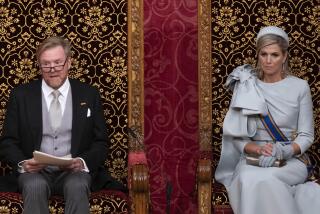Britain Seeks Tax Cuts, Crime Laws : Queen Opens Parliament, Spells Out Government Plans
- Share via
LONDON — Queen Elizabeth II opened the new session of Parliament on Wednesday with a speech spelling out the government’s plans for tax cuts, denationalization of major industries and stiff new laws to combat crime and urban violence.
The program, which Prime Minister Margaret Thatcher described as one of the most far-reaching she has presented in six years as prime minister, also commits Britain to seek agreement with the government of Ireland to ease tension in Northern Ireland.
In keeping with tradition, the government’s program was presented to a joint session of Parliament by the queen from the throne in the House of Lords, although the speech was written by Thatcher. The queen arrived by horse-drawn coach and was ushered into the lords’ chamber amid much pageantry.
More Urgent Issue
By early afternoon, the pomp had given way to debate on the legislative program, and it became clear that Thatcher and her Conservative government plan to stress tough law-and-order legislation. Because of rioting in London and Birmingham, civic order is a much more urgent issue than social security reform or denationalization of industries.
Thatcher’s public-order bill would strengthen police and government powers to deal with street disturbances. Among other things, it would provide for up to 10 years in prison for anyone found guilty of a riot-related offense.
A bill aimed at combatting Britain’s growing drug problem includes provisions for increasing police investigative powers and stripping convicted drug traffickers of all personal wealth unless it can be proved that some of the money was earned legally.
Neil Kinnock, leader of the opposition Labor Party, sought to counter charges that his party is soft on crime. He condemned urban violence as “brutal, vicious entertainment,” but he said it was no coincidence that the rising level of violence came at a time of record unemployment and a growing division between the country’s rich and poor. He urged programs that address the causes, not the symptoms.
“There are certainly no answers to unemployment in this,” he said, referring to the government’s legislative proposals.
Politically Vulnerable
Public opinion polls have consistently shown that Thatcher’s failure to bring down unemployment, now over 13% of the work force, has left her politically vulnerable.
Although Thatcher offered no direct program of job creation, she defended her economic policies, which have brought growth with low inflation. She also proposed measures to facilitate additional growth, including easing requirements for starting businesses and a plan, bitterly opposed by the Anglican and Roman Catholic churches, that would liberalize retail trading laws to permit Sunday shopping.
The government also proposed to sell state-owned industries, including the giant British Gas Corp. and the British Airports Authorities, as part of a plan to underwrite tax cuts.
If all her plans for denationalization go through, Thatcher will have returned to the private sector about 40% of the state-owned industry she inherited.
Shortly after pledging to reach an agreement on Northern Ireland, Foreign Secretary Geoffrey Howe met with his Irish counterpart, Peter Barry, for more than two hours in what was believed to be one of the final rounds of talks before a draft agreement on Ulster is submitted to the two governments.
A Thatcher aide insisted that no agreement had yet been reached but indicated one was likely within the next few weeks. The agreement would reportedly give the Dublin government a role in administering Northern Ireland.
More to Read
Sign up for Essential California
The most important California stories and recommendations in your inbox every morning.
You may occasionally receive promotional content from the Los Angeles Times.













